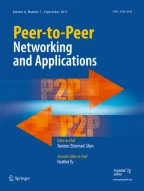Abstract
The changing and fluctuations of channel gains are inevitable in wireless communication. In this paper, a robust power control scheme for cognitive radio networks is proposed with consideration of uncertain channel gains. With the uncertainty, an optimal power control problem is formulated, which keeps the outage probability both of cognitive and primary users below the given threshold and maximizes the sum-utility of cognitive users. The chance-constraint robust approach is applied to transform the uncertain parameters into the determining setting, which is convexity of the outage probability constraints. In order to make the optimization problem solve facilely, the optimization problem is transformed to a convex problem by a suitable relaxation and the exponential transformations. The distributed power control algorithm based on Lagrange dual decomposition is proposed further. Numerical results show the convergence and effectiveness of the proposed chance-constraint robust power control algorithm. The sum of utility is improved and the energy consumption is reduced compared with some existing algorithms.
Similar content being viewed by others
References
Akyildiz IF, Lee WY, Vuran MC, Mohanty S (2006) Next generation dynamic spectrum access cognitive radio wireless networks: a survey. Comput Netw 50(13):2127–2159
Xu D, Li Q (2017) Joint power control and time allocation for wireless powered underlay cognitive radio networks. IEEE Wirel Commun Lett 6(3):294–297
Cai Y, Mo Y, Ota K, Luo C, Dong M, Yang LT (2014) Optimal data fusion of collaborative spectrum sensing under attack in cognitive radio networks. IEEE Netw 28(1):17–23
Liu Z, Wang J, Xia Y, Fan R, Jiang H, Yang H (2016) Power allocation robust to time-varying wireless channels in femtocell networks. IEEE Trans Veh Technol 65(4):2806–2815
Zhou Z, Ota K, Dong M, Xu C (2017) Energy-efficient matching for resource allocation in D2D enabled cellular networks. IEEE Trans Veh Technol 66(6):5256–5268
Long J, Dong M, Ota K, Liu A (2017) A green TDMA scheduling algorithm for prolonging lifetime in wireless sensor networks, IEEE Syst J, 11(2), pp 868–877
Rezki Z, Alouini MS (2011) On the capacity of cognitive radio under limited channel state information over fading channels. IEEE International Conference on Communications, pp 1–5
Liu Y, Xu D, Feng Z, Zhang P (2012) Outage capacity of cognitive radio in Rayleigh fading environments with imperfect channel information. J Inf Comput Sci 9(4):955–968
Gong S, Wang P, Liu Y, Zhuang W (2013) Robust power control with distribution uncertainty in cognitive radio networks. IEEE J Sel Areas Commun 31(11):2397–2408
Mohjazi L, Ahmed I, Muhaidat S (2017) Downlink beamforming for SWIPT multi-user MISO underlay cognitive radio networks. IEEE Commun Lett 21(2):434–437
Zhu L, Zhao X (2016) Robust power allocation for orthogonal frequency division multiplexing-based overlay/underlay cognitive radio network under spectrum sensing errors and channel uncertainties. IET Commun 10 (15):2010–2017
Sun S, Ni W, Zhu Y (2011) Robust power control in cognitive radio networks: a distributed way. IEEE International Conference on Communications:791–796
Zheng G, Ma S, Wong KK, Ng TS (2010) Robust beamforming in cognitive radio. IEEE Trans Wirel Commun 9(2):570–576
Karaca M, Ercetin O, Alpcan T (2016) Entropy-based active learning for wireless scheduling with incomplete channel feedback. Comput Netw 104:43–54
Parsaeefard S, Sharafat AR, Rasti M (2010) Robust probabilistic distributed power allocation by chance constraint approach. In: 21st Annual IEEE International Symposium on Personal, Indoor and Mobile Radio Communications, pp 115–119
Zhang X, Palomar DP, Ottersten B (2008) Statistically robust design of linear MIMO transceivers. IEEE Trans Signal Process 56(8):3678–3689
Zheng G, Wong KK, Ottersten B (2009) Robust cognitive beamforming with bounded channel uncertainties. IEEE Trans Signal Process 57(12):4871–4881
Parsaeefard S, Sharafat AR, Rasti M (2012) Robust distributed power control in cognitive radio networks. IEEE Trans Mob Comput 56(8):3678–3689
Tal AB, Nemirovski A (2008) Selected topics in robust convex optimization. Math Program 112(1):125–158
Gatsis N, Marques AG, Giannakis GB (2010) Power control for cooperative dynamic spectrum access networks with diverse QoS constraints. IEEE Trans Commun 58(3):933–944
Boyd S, Vandenberghe L (2004) Convex optimization. Cambridge University Press, Cambridge
Parsaeefard S, Sharafat AR (2012) Robust worst-case interference control in underlay cognitive radio networks. IEEE Trans Veh Technol 61(8):3731–3745
Acknowledgments
This work is partly supported by National Natural Science Foundation of China under grant 61473247, the Natural Science Foundation of Hebei Province under grant F2017203140 and Science and Technology Research Projects in College of Hebei Province under grant QN2017416.
Author information
Authors and Affiliations
Corresponding author
Rights and permissions
About this article
Cite this article
Zhao, Z., Liu, Z., Wang, P. et al. An approach of robust power control for cognitive radio networks based on chance constraints. Peer-to-Peer Netw. Appl. 12, 280–290 (2019). https://doi.org/10.1007/s12083-018-0665-x
Received:
Accepted:
Published:
Issue Date:
DOI: https://doi.org/10.1007/s12083-018-0665-x
